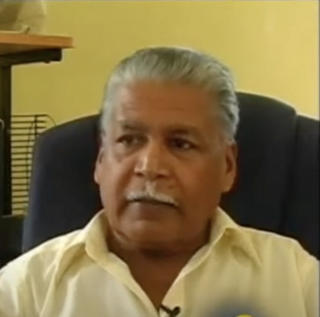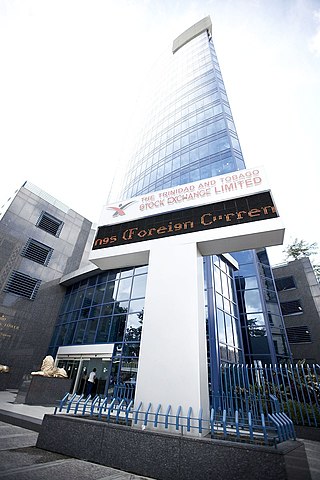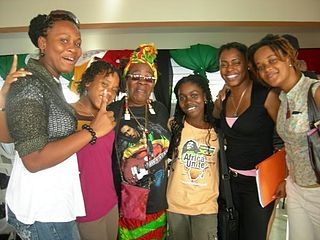History
In 1978 teachers were represented by four unions: de Public Services Association (PSA), led by James Manswell, the Tobago Unified Teachers Association (TUTA), the Trinidad and Tobago Teachers’ Union, (TTTU), whose leader was St. Elmo Gopaul; and the Secondary School Teachers Association (SSTA) headed by Osmond Downer and which represented teachers in the so-called “prestige” schools in the country. The three Trinidad unions were all recognized by the Education Act No. 1 of 1966 as the representative unions for teachers.
Teacher dissatisfaction with representation by the four Trinidad unions had grown in the 1970s. There was the view that adversarial relations between the three units had severely hampered Industrial Relations in the Teaching Service. As early as 1966 there was a struggle between two of the three unions to be the sole representative for any class of, or classes of teachers. The Special Tribunal No. 10 of 1974, which stated that any one of the three unions could represent any class or classes of teachers decided this issue. This resulted in rapid changes of membership among teachers. However, not one of these unions emerged as the majority union.
The implications of teacher representation by four unions had several serious consequences. Any issue raised by one union with the Chief Personnel Officer (CPO) had to be discussed with each union separately. This resulted in the presentation of conflicting arguments to the CPO and his advisor's by the different unions, a situation which acted to the disadvantage of teachers. Additionally, negotiations were often lengthy with a consequently longer period for settlement. The relationship between the three unions was thus described as one involving a great deal of “inter-union rivalry and fragmentation” which was seen as “the biggest disadvantage when negotiating a collective agreement,”.
Teacher Professionalism
Mr. Frank B. Seepersad, the first General Secretary of TTUTA, noted that fragmentation of the unions had caused them to pay little attention to advancing the cause of teacher professionalism. Two existing committees, the Appeals Committee and the Assessment of Qualifications Committee were not being closely monitored. The unions were paying little attention to issues, for example, like in-service training for teachers and refresher courses. Also, the unions were not pressing for much needed changes to the syllabuses of both the primary and secondary schools.
This failure to adequately address teachers’ issues resulted in irrational promotions and transfers, non-recognition of extra qualifications, and the absence of a clear policy on study leave, staff shortages and late staffing. Seepersad observed that the unions were using teachers as “pawns in a power play”, and not seriously addressing those issues which were vital to teachers professional development and to education.
Negotiating problems
In 1971 the problems over negotiations continued with the PSA refusing to sit in joint negotiations with what they described as "minority unions". As a result, the salaries issue was referred to the Special Tribunal and teachers had to wait almost nine years for a settlement of this issue.
In 1974, the Special Tribunal called for joint negotiations through a joint negotiations committee but again the PSA refused to join in the process. There was an additional problem in that, in 1971, the PSA, which usually went in first in negotiations, signed a four-contract contrary to the usual procedure as three-year contracts. This contributed to an exodus of teachers from the PSA.
Committee for the Unification of Teachers
As the decade came to a close, dissatisfaction came to a head in 1979 and on March 31, 1979 approximately 150 teachers gathered at the Mt. Hope Junior Secondary School, headed by Frank B Seepersad, who was a teacher there, to discuss the unsatisfactory state of the teaching profession, and the meeting adopted a resolution seeking to ensure one autonomous body for teachers. A decision was also arrived at to establish a steering Committee of 22 to oversee the formation of one union for all teachers. Volunteers were sought to serve on this committee - the Committee for the Unification of Teachers (COMFUT)
Another mass meeting of May 5, 1979 at the Mucurapo Senior Secondary School, adopted a resolution to have COMFUT seek legal advice as to how it should proceed towards its goal of establishing a “…single autonomous professional organisation of teachers, where every individual teacher has a say in policy-determining decisions of the organisation through proper representation in the management of the organisation.”
The Unification Committee drew up an action plan which included:
- Stirring up teacher participation by using several publicity techniques, bumper stickers, buttons, rallies and public meetings;
- Seeking and obtaining about 9,000 signatures to the call for a single union for teachers, and an amendment of the Education Act (Act 1 of 1966) to facilitate teacher representation by a single majority union;
- Seeking the resignation of the Officers of the existing unions so as to make room for a single union;
- Fund raising activities.
Included in the campaign was the demand for an amendment of the Education Act to ensure that one union, the majority union would be recognised as the bargaining body for teachers. Ten thousand (10,000) teachers’ signatures were needed to ensure recognition as the majority union
Unity and recognition
The period from March 1979 to December 1981, when TTUTA was finally recognised by the Registration, Recognition and Certification Board, was one of relentless struggle with the authorities in support of the cause for one union for all teachers. Thousands of teachers marched around the Red House and through the streets demanding that there be one umbrella body for all teachers.
On April 24, 1980 TTUTA was registered as a Trade Union. It is worth noting that TTUTA got its name from adding the word 'Trinidad' to the 'Tobago Unified Teachers Association' thus resulting in the Trinidad and Tobago Unified Teachers Association. In March 1981, the state presented a draft revision of the Education Act 1966, which allowed TTUTA to be recognised as a union for teachers, alongside the three other teachers unions in the country.
This proposal was strongly rejected at a mass meeting of members of the Association in March 1981. Under continued pressure from the mass of teachers the government conceded and the Education Act 1966 was amended to give TTUTA full recognition as the majority union for teachers. The Registration, Recognition and Certification Board accorded official recognition of the Association in December 1981.

The Scottish Trades Union Congress (STUC) is the national trade union centre in Scotland. With 40 affiliated unions as of 2020, the STUC represents over 540,000 trade unionists.

The National Association of Schoolmasters Union of Women Teachers (NASUWT) is a TUC and ICTU -affiliated trade union representing teachers, including headteachers, throughout the United Kingdom.

The Australian Education Union (AEU) is an Australian trade union, founded in 1984 as the Australian Teachers Union, which is registered with Fair Work Australia as an employee group, and is affiliated with the Australian Council of Trade Unions. The AEU is Australia's third largest trade union, with 198,480 registered members in 2021, consisting of educators who work in public schools, colleges, early childhood and vocational settings in all states and territories of Australia. Members include teachers and allied educational staff, principals and administrators mainly in government school and TAFE systems. Teachers working in the private schools system are covered by the Independent Education Union of Australia (IEU). In some states the AEU shares coverage of some members with the National Tertiary Education Union, Community and Public Sector Union and United Workers Union. Through the Federation of Education Unions, the AEU works closely with the two other Federal unions which cover educators in non-government schools and universities. The AEU is also internationally affiliated to the Education International, which the AEU claims is "the largest non-government organisation in the world."

Naparima College is a public secondary school for boys in Trinidad and Tobago. Located in San Fernando, the school was founded in 1894 but received official recognition in 1900. It was established by Dr. Kenneth J. Grant, a Canadian Presbyterian missionary working among the Indian population in Trinidad. The school was one of the first to educate Indo-Trinidadians and played an important and crucial role in the development of an Indo-Trinidadian and Tobagonian professional class. Naparima is derived from the Arawak word (A) naparima, meaning ‘large water’, or from Nabarima, Warao, for ‘Father of the waves.’

Raffique Shah is a Trinidad and Tobago trade union leader and political commentator. He is also a former Member of Parliament and mutineer, having led a mutiny of Trinidad and Tobago Regiment in 1970.

Hillview College is a government-assisted Presbyterian secondary school situated on the foothills of the Northern Range at the top of El Dorado Road in Tunapuna, Trinidad and Tobago. The motto Humani Nihil Alienum, which is adapted from a famous quotation by Roman African playwright Terence, means 'Nothing concerning humanity is alien to us'. Expressed in a positive way it means, 'I am interested in everything concerning mankind'.

The Caribbean Court of Justice is the judicial institution of the Caribbean Community (CARICOM). Established in 2005, it is based in Port of Spain, Trinidad and Tobago.
The National Trade Union Centre of Trinidad and Tobago (NATUC) is a trade union federation in Trinidad and Tobago. It was created in 1991 by the merger of the Trinidad and Tobago Labour Congress (TTLC) and the Council of Progressive Trade Unions (CPTU). It has a membership of 100,000.

The Trinidad and Tobago Stock Exchange (TTSE) is the main stock exchange in the Republic of Trinidad and Tobago, and the largest stock exchange in the Caribbean region by market capitalization. As a member-state of CARICOM several companies from Barbados, Jamaica, Saint Vincent and the Grenadines and the Eastern Caribbean Securities Exchange also cross-list their stocks onto the Trinidad and Tobago Stock Exchange. The unique four symbol alphanumeric Market Identifier Code (MIC) used to identify the TTSE as defined under ISO 10383. of the International Organization for Standardization (ISO) is: XTRN.

The Congress of the People (COP) is a political party in Trinidad and Tobago. Its current political leader is Kirt Sinnette. Its symbol is the "Circle of Circles".
The Trinidad and Tobago Airline Pilots Association is a trade union in Trinidad and Tobago with members in the former BWIA and Tobago Express, now Caribbean Airlines. The Trinidad and Tobago Airline Pilots Association (TTALPA) is the registered, Recognised Majority Union and bargaining unit for Pilots in Trinidad and Tobago. TTALPA was officially registered in 1972 under the Trade Unions Ordinance and pursuant to the provision of Section 86(1) of the Industrial Relations Act 1972.
The National Association of Schoolmasters (NAS) was a trade union representing male schoolteachers in the United Kingdom.
The National Library and Information System of Trinidad and Tobago is a corporate body established by the NALIS Act No. 18 of 1998 to administer the development and coordination of library and information services in Trinidad and Tobago.
Clotil Walcott was a trade unionist in Trinidad and Tobago.

The Public Service Association of NSW (PSA) is a union which covers employees in the government, university and related public sector in New South Wales. The union is registered under New South Wales state legislation and is affiliated with the Labor Council of New South Wales.

Barbados and Trinidad and Tobago formally established diplomatic relations on Barbados' national date of independence, 30 November 1966. Barbados maintains non-resident representation to Port of Spain, and the Republic of Trinidad and Tobago maintains non-resident representation to Bridgetown. Both countries are members of many shared organisations, including the Association of Caribbean States, the Commonwealth of Nations, CARICOM, CARIFORUM, and the Community of Latin American and Caribbean States.

Women in Trinidad and Tobago are women who were born in, who live in, or are from Trinidad and Tobago. Depending from which island the women came, they may also be called Trinidadian women or Tobagonian women respectively. Women in Trinidad and Tobago excel in various industries and occupations, including micro-enterprise owners, "lawyers, judges, politicians, civil servants, journalists, and calypsonians." Women still dominate the fields of "domestic service, sales, and some light manufacturing."
Maire MacDonagh was an Irish trade union official, who served as general secretary of the Association of Secondary Teachers, Ireland for 25 years.











